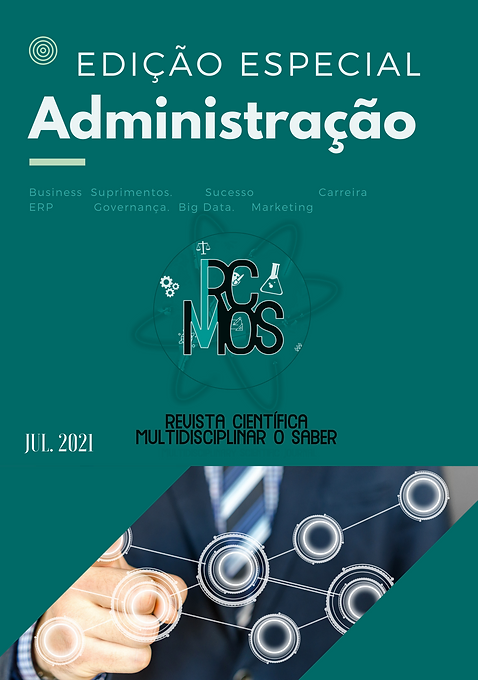EMOTIONAL INTELLIGENCE IN ORGANIZATIONS: ASSET OR LIABILITY FROM THE PERSPECTIVE OF MANAGERS?
DOI:
https://doi.org/10.51473/rcmos.v1i1.2021.714Keywords:
management; markets; logistics; management; economyAbstract
this paper aims to analyze and investigate how supply chain management can represent a competitive advantage for organizations. With the advent of the pandemic caused by the covid-19, there has been an exponential growth in the world e-commerce, and this has required managers and companies to adopt new models of economy capable of anchoring the planning, execution and control of effective actions the management of fundamental assets for the oxygenation of purchasing, logistics, storage, production and delivery processes to consumer markets. The new technologies of communication and telecommunications, which put new tools, such as artificial Inteligence, robotics and Big Data, at the service of this intricate gear of Supply Chain Management, at the same time also pose new challenges to the administrators and the organizations that need to adapt to the new demands and demands of the markets and consequently to the new ways of thinking strategically the delivery of value and the competitive advantage for the stakeholders.
Downloads
References
BORDIEU, Pierre. Sociologia. São Paulo: Ática, 1983.
BRASIL. Decreto Nº 10.502, de 30 de setembro de 2020. Institui a Política Nacional de Educação Especial: Equitativa, Inclusiva e com Aprendizado ao Longo da Vida. Diário Oficial da União, seção 1, Brasília, DF, ed. 189, 2020a. Disponível em: https://www.in.gov.br/en/web/dou/-/decreto-n-10.502-de-30-de-setembro-de-2020-280529948. Acesso em: 28 jun. 2021.
BRASIL. Instituto Nacional de Estudos e Pesquisas Educacionais Anísio Teixeira. Plano Nacional de Educação PNE 2014-2024: Linha de Base. Brasília: Inep, 2015. Disponível em: http://portal.inep.gov.br/documents/186968/485745/Plano+Nacional+de+Educa%C3%A7%C3%A3o+PNE+2014-2024++Linha+de+Base/c2dd0faa-7227-40ee-a520-12c6fc77700f?version=1.1. Acesso em: 28 jun. 2021.
BRASIL. Ministério da Educação. Instituto Nacional de Estudos e Pesquisas Educacionais Anísio Teixeira. Censo Escolar 2020. gov.br, 2020b. Disponível em: https://www.gov.br/inep/pt-br/areas-de-atuacao/pesquisas-estatisticas-e-indicadores/censo-escolar/resultados. Acesso em: 2 jul. 2020.
BRASIL. Ministério da Educação. Secretaria de Modalidades Especializadas de Educação. PNEE: Política Nacional de Educação Especial: Equitativa, Inclusiva e com Aprendizado ao Longo da Vida. Brasília: MEC; Semesp, 2020c. Disponível em: https://www.gov.br/mec/pt-br/assuntos/noticias/mec-lanca-documento-sobre-implementacao-da-pnee-1/pnee-2020.pdf. Acesso em: 29 jun. 2021.
CASCUDO, Luís da Câmara. Dicionário do folclore brasileiro. 6. ed. Belo Horizonte: Itatiaia, 1993.
v. 7 ed. especial (2021): RCMOS - Revista Científica Multidisciplinar O Saber. ISSN: 2675-9128
COMITÊ GESTOR DA INTERNET NO BRASIL. Pesquisa sobre o Uso das Tecnologias de Informação e Comunicação nos Domicílios Brasileiros – TIC Domicílios 2019. Cetic.br, 26 maio 2020. Disponível em: https://cetic.br/media/analises/tic_domicilios_2019_coletiva_imprensa.pdf. Acesso em: 2 jul. 2021.
DURKHEIM, Émile. O Fato social e divisão do trabalho; apresentação e comentários Ricardo Musse. São Paulo: Ática, 2011. (Ensaios comentados). Disponível em: https://edisciplinas.usp.br/pluginfile.php/352563/mod_resource/content/1/MUSSE%2C%20Ricardo%3B%20DURKHEIM%2C%20%C3%89mile%2C%20Fato%20social%20e%20divis%C3%A3o%20do%20trabalho.pdf. Acesso em: 2 jul. 2021.
FREYRE, Gilberto. Casa-grande & senzala. 42. ed. Rio de Janeiro: Record, 2001.
FUNDAÇÃO CARLOS CHAGAS. Pesquisa: Inclusão escolar em tempos de pandemia. [S. l.]: Fundação Carlos Chagas, 2020. Disponivel em: https://www.fcc.org.br/inclusao-escolar-em-tempos-de-pandemia/#sobre. Acesso em: 20 jun. 2021.
MINAYO, M. C. de S.(Org.) Pesquisa social: teoria, método e criatividade. Petrópolis, RJ: Vozes, 2001.
RIBEIRO, Darcy. O Povo Brasileiro. A formação e o Sentido do Brasil. São Paulo: Companhia das Letras, 1995.
Downloads
Published
Issue
Section
License
Copyright (c) 2024 Geisse Martins (Autor/in)

This work is licensed under a Creative Commons Attribution 4.0 International License.










